Tacked to the wall of his bedroom on the Oneida Indian Reservation is evidence of how hard Michael Williams worked as a high school student — an acceptance letter to Hamline University in St. Paul, Minnesota.
But the real prize, the acceptance letter to UW–Madison, his dream school, travels with him in his backpack, always within reach.
Growing up, Williams, 18, says he watched too many young people flounder in their attempts to leave the reservation and find opportunities elsewhere. He was determined not to be one of them.
“I’ve always wanted to further my education,” he says. “The more I know, the better I feel personally. And I think college is the step to a successful job and a secure future.”
The real prize, the acceptance letter to UW–Madison, his dream school, travels with him in his backpack, always within reach.
Williams participated in an extensive college pipeline program sponsored by UW–Madison for students from tribal communities. It is a new component of a long-running UW diversity initiative called the Information Technology Academy. The first cohort of 10 Native students, including Williams, is graduating from the program this spring and will be in Madison June 3 for a ceremony marking the occasion.
“The program changed my life,” says Williams, who plans to begin classes at UW–Madison this fall.
He had always hoped to attend college, he says, but UW had not been on his radar prior to the program. During a trip to Madison, he was captivated by the urban environment and found everything on the campus “new and exotic.” He could picture himself among the student body.
“I especially like the idea of walking to class every day and running into friends and new strangers,” says Williams, who has always traveled to school by bus or car. “It’ll be an experience I’ve never had before.”
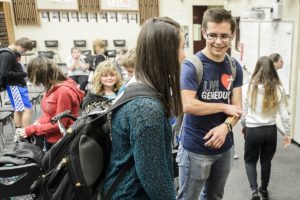
The initiative is one of the most direct ways university administrators are trying to increase enrollment of American Indian students, currently estimated at just under 1 percent of 43,336 students.
A little background: The Academic Technology Department of the UW’s Division of Information Technology created the Information Technology Academy (ITA) 17 years ago. There are now three programs under its umbrella. All work to increase the number of students of color at UW–Madison and in the field of information technology — two areas where historically they’ve been underrepresented.
ITA Madison, the original program, began in 2000 and works with students from Madison public schools. Three years ago, the tribal component was added to more explicitly recruit American Indian students. It is called ITA’s Tribal Technology Institute and serves two communities: the Oneida Nation near Green Bay and the Lac du Flambeau Band of Lake Superior Chippewa in northern Wisconsin.
“I’ve always wanted to further my education. The more I know, the better I feel personally. And I think college is the step to a successful job and a secure future.” — Michael Williams
All three programs require multiyear commitments: four years for Madison students; three years for Oneida and Lac du Flambeau students. In addition to learning things like computer coding and website design, the students build study skills, develop as leaders, receive one-on-one tutoring, complete internships, and spend considerable time on the UW–Madison campus.
The goal is to prepare the students to be competitive in the college applications process and beyond, says Ron Jetty, the academy’s executive director.
“There’s a strong focus on technology, but the program really is so much more,” he says. “We’re preparing them for success in the academic world and the workforce.”
Acceptance into the program is competitive, and interest is at an all-time high. There were 165 applicants for this fall’s cohort of 30 ITA Madison students. Each of the tribal programs had 15 slots available this fall, and both programs had more applicants than openings. For information on applying for the next available cohort in 2018-19, see the DoIT Academic Technology website.
‘Nothing else like it’
Williams will graduate in a few days from Seymour Community High School, where he’s known as a soccer player, a talented musical performer, and a wearer of wry T-shirts.
Many of those shirts reflect a playful boastfulness, like “I Pretty Much Run This Place” and “The Awesome is Strong with This One.” Another says “Straight Outta the Rez.” He doesn’t wear that one to school because he thinks the humor and context would be lost on some of his classmates.
“I’m proud of my Native heritage — it’s not something I hide — but I don’t boast about it or anything,” he says. “And if someone says something offensive, I’ll give my input.”
“There’s a strong focus on technology, but the program really is so much more. We’re preparing them for success in the academic world and the workforce.” — Ron Jetty
Seymour Community High School is a public school of 710 students about two miles from the Oneida Indian Reservation. Paula Tauscheck, an employee of Oneida Nation, is based at the school and provides academic support to American Indian students, who make up about 15 percent of the student body. She calls the UW pipeline program “amazing” in its scope.
“There’s nothing else like it,” she says. “I actively pursue students to consider applying. I tell their parents, ‘Someone is trying to hand you something very, very valuable here.’”
Students who complete the program and are accepted to UW–Madison receive full-tuition scholarships for four years and become scholars in the university’s PEOPLE program. The students receive no preferential treatment in the admissions process; they must compete equally with all other applicants.
Every spring as the school year comes to a close, Tauscheck says she is hopeful yet apprehensive about the American Indian seniors at her school. Even those with really promising futures can sometimes stall out, she says.
“Some of our students come from an environment with a lot of poverty, and if they succeed, there will be people in the community who say, ‘Who do you think you are? Do you think you’re better than us?’” Tauscheck says. “That can weigh heavily on students, and sometimes they sabotage themselves because of it. Michael shows no signs of that.”
Tauscheck urged Williams to apply for the program and calls him brilliant. He’s a big video gamer, so the technology aspect interested him. He lives with his younger sister and mother and is considered the techie in the family.
Williams says the institute opened his eyes to how much more he could learn. Through the technology component, he became well-versed in software like Adobe Premiere, Adobe Illustrator, Adobe Photoshop and Microsoft Notepad. For one project, he and his friends filmed a mini-suspense thriller that mixes elements of “The Blair Witch Project” with an episode of “Scooby-Doo.”
Williams says he’s learned a lot through the program about himself and what he might want to do with his life — study psychology, then maybe law, with an eye toward returning to the reservation to help his fellow tribe members.
“Some of our students come from an environment with a lot of poverty, and if they succeed, there will be people in the community who say, ‘Who do you think you are? Do you think you’re better than us?’” — Paula Tauscheck
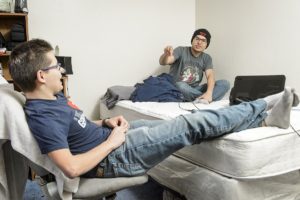
The program was not without challenges for Williams, like finding time for its coursework on top of finishing his regular homework, working 15-20 hours a week at the Seymour McDonald’s, and participating in sports and other extracurricular activities. This was especially true earlier this year when he was cast as the male lead in the school’s production of “Seven Brides for Seven Brothers.”
The time commitment is no small thing. The students must complete a blended curriculum of in-person instruction and online coursework that averages about four hours a week during each academic year. There are additional requirements such as weekend trips, summer camps at UW–Madison, and an internship.
“They’re engaged year-round,” says Christopher Kilgour, program manager for the two tribal components. “We expect a lot from our students and they are held accountable.”
Over ITA’s history, almost all its graduates have gone on to college, whether UW–Madison or elsewhere. About half have been accepted to UW–Madison as freshmen, and others transfer in later.
Williams set aside every Sunday to work on his projects and coursework. He’s been disciplined about his future for a long time, deciding years ago he would not touch alcohol or drugs. He’s stuck to his pledge, he says.
In an unexpected bonus, Williams says he met his best friend, Chris Gourd, through the institute. Gourd, 18, a member of the Ho-Chunk Nation, also is a senior at Seymour High School and is graduating this spring from the program.
Hanging out in Williams’ bedroom on a recent day after school, the two riffed like a comedy duo. Asked to describe each other, they cracked each other up with jokey responses —“cocky,” “arrogant,” “self-centered”— before turning more serious.
Like Williams, Gourd has been accepted to UW–Madison. But he has deferred his enrollment and instead will begin U.S. Marine Corps training in August. Military service runs in his family and exerts a strong pull, he says.
This year, of the 37 students graduating from the three programs, all will be going either to college or into the military. Fifteen have been accepted to UW–Madison and 14 have enrolled.
Over ITA’s history, almost all its graduates have gone on to college, whether UW–Madison or elsewhere. About half have been accepted to UW–Madison as freshmen, and others transfer in later. There are no expiration dates on the scholarships.
“I could not be more proud of both boys — all of the students, for that matter — and the things they’ve accomplished and the obstacles they’ve overcome.” — Christopher Kilgour
Williams says he didn’t try to talk his friend into joining him at the UW this fall. “He’s hard-headed, so it wouldn’t have worked anyway,” he says. “And even though he’s innately intelligent, I don’t think he’s ready to study that hard.”
Gourd laughed but didn’t disagree. He may end up at UW–Madison one day, he says, but for now, the timing’s not right.
Both young men, despite their self-deprecation and feigned arrogance at times, are incredibly diligent and talented and have their hearts and minds in the right place when it comes to academics and their communities, Kilgour says.
“I could not be more proud of both boys — all of the students, for that matter — and the things they’ve accomplished and the obstacles they’ve overcome,” Kilgour says.
Hard-core determination
A couple hours farther north, Kenadi Mayo, 18, another participant in the UW program, is finishing her senior year at Lakeland Union High School in Minocqua. The public school enrolls just over 700 students, about 20 percent of them American Indian.
Mayo, who is Chippewa, lives on the Lac du Flambeau Indian Reservation about 15 minutes from the school. She’s soft-spoken, but the outward reserve masks hard-core determination.
“I do what needs to be done,” she says.
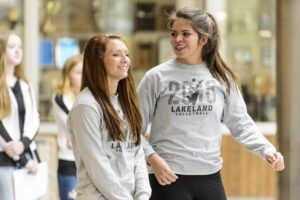
A multisport athlete, she’s a 6-foot-tall standout in volleyball and the team’s co-captain. This summer, she will play on the volleyball team representing Wisconsin at the North American Indigenous Games in Toronto. It is the second time she’s been chosen for the honor.
For one of her multimedia assignments in the institute, Mayo compiled video highlights of her high school team’s volleyball season.
She enjoyed much about the institute, she says, but is relieved to have it behind her. As with Williams, she found it challenging to balance the coursework with her other commitments — sports, Model United Nations, Spanish club, DECA, homework in her advanced-level classes.
“I felt at times that it was almost like being in a college environment,” she says. “Here I was just trying to get used to high school, and then I had this whole additional level of stress. But I’m definitely glad I did it. It was a lot of commitment, but it taught me how to study better and how to plan more seriously for my future.”
“I felt at times that it was almost like being in a college environment. … It was a lot of commitment, but it taught me how to study better and how to plan more seriously for my future.” — Kenadi Mayo
She is interested in business and marketing and has been accepted to Arizona State University and DePaul University in Chicago. She was not accepted to UW–Madison, her first choice, so instead has enrolled at Madison College this fall. She hopes to transfer to UW–Madison her sophomore year, at which point she would be eligible for a full-tuition scholarship for her remaining three years.
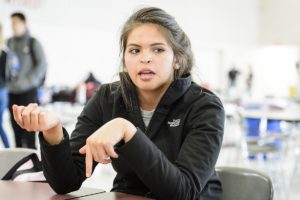
At the June 3 graduation ceremony in Madison, Mayo will be giving remarks on behalf of the Lac du Flambeau students. Her advice to others in the program, she says, would be to “stick it out, even though it’s a lot of work. You’ll always have the benefit of what you learned, even if you don’t go to UW–Madison.”
Kenadi Mayo said she’s glad she participated in ITA’s Tribal Technology Institute, though it wasn’t easy. Her advice to other students is to stick with it, even when the going gets tough.
Williams will be the class speaker for the graduating Oneida students. Liliana Teniente, 18, a senior at Madison La Follette High School, will speak on behalf of the Madison contingent.
Mayo’s mother, Dee Allen, says she appreciates that her daughter, through the program, has become comfortable with UW–Madison and what it offers. She hopes the familiarity will address a frequent problem she’s noticed.
“Many of our students who enroll in college drop out before the end of their first year or right after,” says Allen, who serves on the Lac du Flambeau Tribal Council and works as an environmental program manager in the tribe’s Natural Resources Department. “They grow up in such a close-knit community that I think being away from home and on their own for the first time can be a bit of a shock. I’m hoping this program gave my daughter a taste of the support that’s out there for her.”
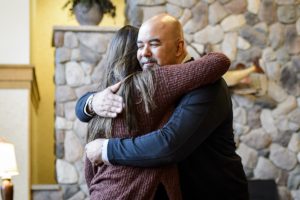
Jetty agrees that continued support in college will be valuable.
“Because of our program, our students have the confidence to ask questions, seek available resources, and keep believing in themselves as they move forward,” he says. “They enter the next phase of their academic career with the knowledge that commitment and hard work pays off. We feel strongly that ITA graduates are better prepared to be successful in college and also are poised to be engaged community leaders.”
— Story by Doug Erickson / University Communications